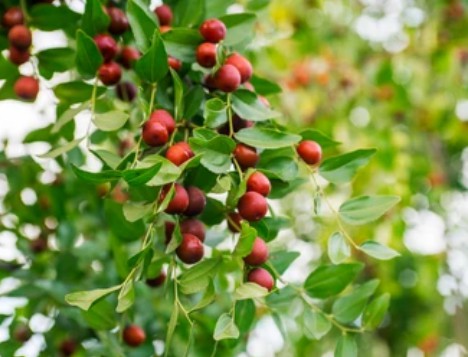Ziziphus jujuba, also known as a date tree, is a fruit crop widely grown worldwide. The fruit of the date tree is rich in nutrients, containing high levels of vitamins, many trace elements, and sugar. Studies have shown that it has liver-protective, immune-boosting, and sedative properties. The flowers of the date tree are relatively small and difficult to dehiscence, resulting in a very low fruit set. Currently, most major varieties have a high abortion rate, which makes it difficult to obtain new varieties of dates using traditional cross-breeding methods. With the development of molecular biology, transgenic technology has opened a new way for date variety improvement, which can greatly shorten the breeding cycle and achieve targeted improvement of a certain trait. Genetic engineering breeding has received increasing attention from researchers and breeders because of its advantages of rapidity, purposefulness, and overcoming the difficulties of hybridization. Genetic engineering methods are expected to rapidly obtain new varieties of date trees.

Lifeasible, as a senior expert in plant genetics, has been committed to providing you with constantly optimized date tree gene transformation services. Our versatile date tree gene transformation platform is based on the Agrobacterium transformation method. It is also equipped with experts with many years of experience in plant genetics to ensure an efficient and reliable service process. Firstly, our experts use the leaves of date trees as transgenic recipient material and insert T-DNA into the date tree genome using Agrobacterium carrying the target gene vector. Subsequently, we screen, differentiate, and positively identify the resistance required by our customers. Eventually, you will receive date tree transgenic seedlings and a detailed lab report. For our various date tree genetic transformation services, you can choose from the below.

Customers can provide constructed date tree transformation vectors directly, and Lifeasible also offers vector construction services.
| Concentration | Volume | Other requirements |
| 80-100 ng/μL | ≥10 μL | no degradation & no contamination |
| Bacterial broth | Bacterial plate |
| Bacterial broth up to 1-year-old, preserved in glycerol | Bacterial plate activated within one week |
*For special varieties and customized services, the experiment time and the number of seeds needed may be increased. For this, please contact our staff for more information.
*Plasmids, E. coli and Agrobacterium require cryopreservation and mailing under dry ice to avoid degradation, inactivation and impact on experimental results.
*The strains, vectors and receptor materials used in the whole experiment can be saved for free for half a year for customers, and you can pick them up at any time if you need them.
We will equip the whole experiment with experts to provide you with professional and comprehensive project consultation, experiment customization, progress tracking and result report Q&A services. You can work with us with confidence because we will keep our clients informed at key points of the experiment and report project results on a regular basis. With our one-stop service, all you need to do is to submit samples as required and wait patiently for the results, and then we'll do the rest.
Lifeasible's experts have comprehensive knowledge and years of experience solving technical problems and challenges in Ziziphus jujuba transformation. We can provide customized solutions to help you study a wide range of date tree varieties. Our services guarantee the success of your project. For more information or any inquiry needs, please feel free to contact us.